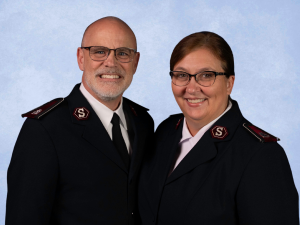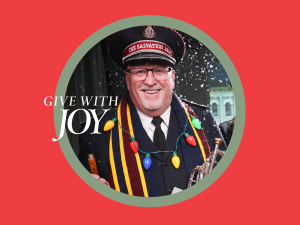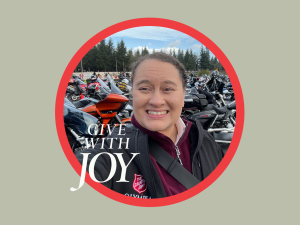People call him “Ragu the Plumber.”
But these days Ragu Razo doesn’t work as a plumber. Six years ago, he swapped his old nine-to-five job to drive a refrigerated truck for The Salvation Army in Mesa, Arizona.
Every weekday, Razu collects food from five different stores on his route in the East Valley. The food is still good, but it won’t be sold anymore at stores because it’s reached the “sell by” date. Once Ragu’s loaded up the food, he brings it back to the Mesa Citadel Corps so it can feed hungry families in the area.
It’s all part of the Grocery Food Rescue Program, a partnership between the United Food Bank and The Salvation Army.
Ragu’s efforts help feed about 50 families a day. And it’s not just canned food. The corps is able to offer meat, poultry, fresh fruits and vegetables, milk, bread and other food staples to clients.
Not to mention, the program helps keep food that is still good out of landfills. Each year, some 119 billion pounds of food is wasted in the U.S., according to Feeding America. That equates to 130 billion meals and more than $408 billion in food discarded each year.
That means that nearly 40 percent of all food in the U.S. is wasted.
That number’s even more concerning when you consider 34 million Americans are living in food-insecure households.
That’s why food rescue programs like the one Ragu helps out are more important than ever.
In this episode, we talk with Ragu about his “second career,” what fuels his desire to give back, and what it’s like to see firsthand just how much food is being saved in one community.
Show highlights include:
- The story behind Ragu Razo’s name.
- What prompted Razo to go from a career as a master plumber to a Salvation Army driver.
- How he heard about the role.
- How Razo’s upbringing has impacted his desire to help others.
- What surprised him about helping operate the food program.
- How this role has changed his outlook on waste and consumption.
- What it means to Razo to see the impact he is involved with.
- How you can help make a difference in fighting food insecurity wherever you are.
Listen and subscribe to the Do Gooders Podcast now. Below is a transcript of the episode, edited for readability. For more information on the people and ideas in the episode, see the links at the bottom of this post.
* * *
Christin Thieme: Well, Ragu, welcome to the Do Gooders Podcast. Thank you so much for joining me today.
Ragu Razo: You’re welcome.
Christin Thieme: First off, as we get started here, can you tell me about your name? I can’t say that I’ve met many Ragu Razos.
Ragu Razo: Okay. Well, for the record, everybody knows my real name is Hernando Jose Razo. “Ragu” is my professional name. Ragu is a lot easier to remember.
Christin Thieme: Yeah, it’s a good name. So before you joined The Salvation Army, you worked as a master plumber, I understand. What prompted you to switch from a life of a plumber into your gig now driving a truck for The Salvation Army?
Ragu Razo: Well, one of the reasons, 55 years of being a plumber tends to wear and tear on your back. I’m not a spring chicken anymore. I started in the plumbing business basically when I was 15 years old and I was working with Bender Plumbing and we did all the movie stars’ homes over in California and it’s a lot of hard work. So this job, it meets my criteria.
Christin Thieme: I like it, a little better fit for today. Can you tell us a little bit about how you found this role and how you became connected to The Salvation Army?
Ragu Razo: Well, I started as a volunteer. I wanted to do something with my time. I volunteered for the events at the Convention Center, Phoenix Convention Center for Thanksgiving and Christmas. I really don’t have any family. I’m one of last of the Mohicans. So I went down there and volunteered. I got a kick out of it. I just got more and more involved.
Christin Thieme: Did you grow up in an environment in which giving back was heavily emphasized?
Ragu Razo: I get that from my mother. My mother was home. She used to take care of me. I guess I take after my mom. But I’m stubborn like my mom.
Christin Thieme: What surprised you most about helping run this food rescue program?
Ragu Razo: Well, I think I kind of already said this, it makes me feel good. Makes me feel good by giving back to the community. Not getting any younger. I do something. It’s not all about money. I can make all the money I want really, but this is a very rewarding job.
Christin Thieme: Has your work helping to divert so much food from landfills changed the way that you look at waste and consumption?
Ragu Razo: Oh yes, ma’am…Well, I was raised that way. Eat everything on your plate. And if you don’t like what you were getting for dinner, you didn’t eat, go to bed hungry. So yeah, I don’t waste food.
Christin Thieme: Most of the food recovered in this program is being donated by corporations—Walmart, Costco, Sprouts Farmer’s Market and so on. But what can everyday people do to help waste less food and get it where it needs to go?
Ragu Razo: In my opinion, more people need to get involved with the program. More people need to step up and volunteer. That would really, really help because we’re a small, we’re like a MASH unit. Whereas at DHQ [divisional headquarters], they have more individuals. We’re a small unit, so the more people we get involved volunteering would help us, would help all of us a lot.
Christin Thieme: What does an average day look like for you when you get there? Walk us through what happens.
Ragu Razo: Well, I’m the first one here. I get here bright and early in the morning because of the heat. I get the building opened up, the alarm shut off, prepped, ready to go. And I have to hit my stores. I have a timeframe, time schedule, and I have to meet that time schedule. Sometimes I’m ahead of schedule. Sometimes I fall behind. Most time I’m ahead and I’ve got a schedule. And I have to get all the food back here quick enough so they can sort through the food and put the meat away and put the produce away and put the bakery product away.
Yesterday we went and picked up 2,000 pounds of water from Larry H. Miller Ford. It was donated to the corps. Water’s such a precious commodity right now. So there’s many, many paths to do right.
Christin Thieme: What does it mean to you personally to know that you are playing such an important role in saving that food and getting it to the corps so that it can be given out to people in need in your community?
Ragu Razo: Like it says in the Bible, you got to spread it around. Got to spread it around. You got to take care of others. Take care of yourself, you got to take care of others. I’m kind of blessed with my health. Like I said, I’m not getting a spring checking, but I’m strong as a bull.
Christin Thieme: Finally, what would you want people to know about hunger in your community, in our country, and how The Salvation Army helps to fight against it?
Ragu Razo: Well, because of the times and because of the economy, everybody needs help. Everybody. Doesn’t matter what bracket you’re in. And like I think I said before, we have to help others. We can’t just think of ourselves. We got to think of everybody else.
Christin Thieme: Well, Ragu, thank you for what you do, getting food to the right people and helping The Salvation Army with its mission. And thank you for sharing with us today.
Ragu Razo: Cool beans.
Additional resources:
- See how The Salvation Army fights hunger.
- It’s because of people like you The Salvation Army can serve more than 24 million Americans in need each year. Your gift helps fight for good all year in your community. It’s an effort to build well-being for all of us, so together we rise—and that good starts with you. Give to spread hope with a donation of funds, goods or time today.
- You can make an impact for good with whatever time and skills you have. Whatever your interest, there is a you-sized need for goodness in the world. Get the guide on How To Be An Impactful Volunteer and join us in Doing Good today.
Listen and subscribe to the Do Gooders Podcast now.












